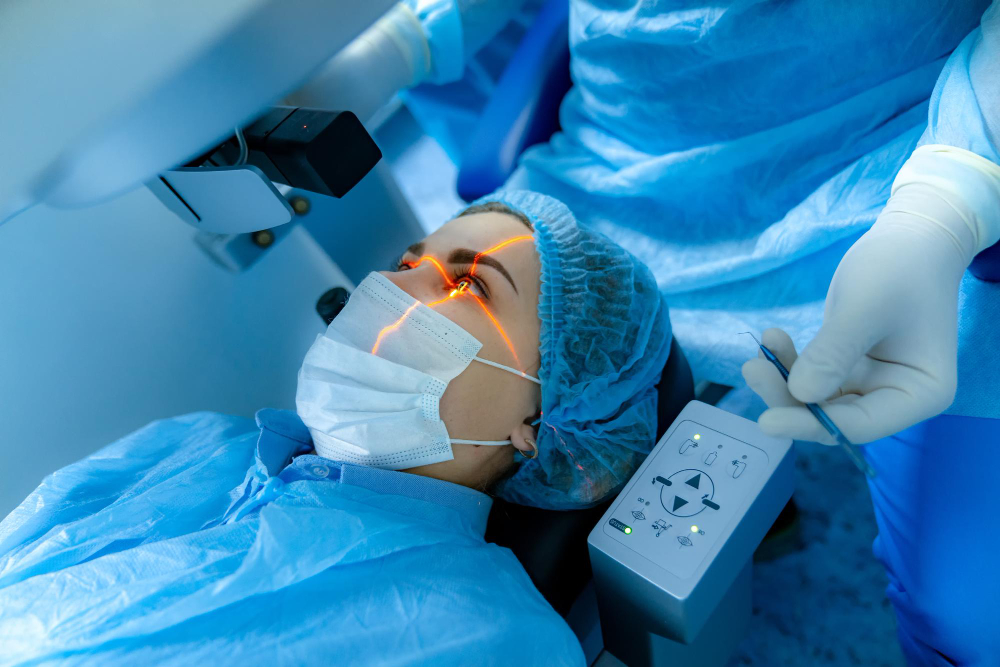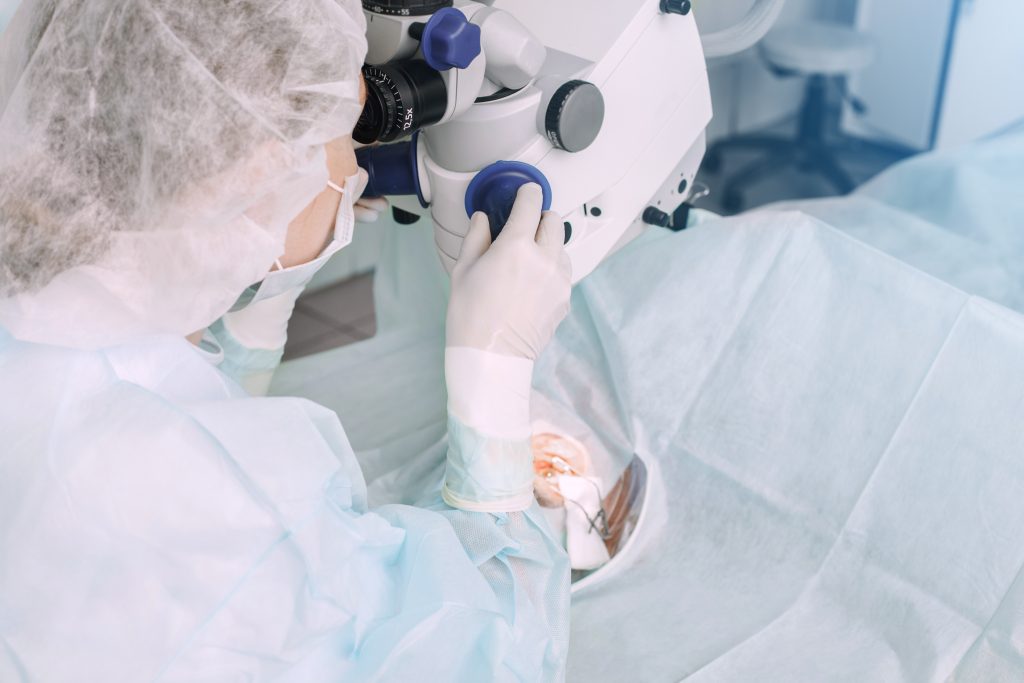SMILE Eye Surgery
SMILE Eye Surgery, a laser eye treatment, corrects astigmatism and nearsightedness. Opting for SMILE could eliminate the need for glasses or contact lenses. However, fulfilling specific requirements is necessary to qualify for the surgery.

What Is SMILE Eye Surgery?
SMILE is a surgical procedure performed to fix problems with vision caused by refractive errors. There are four main types of refractive errors: myopia, hypermetropia, astigmatism, and presbyopia. Myopia refers to nearsightedness, hypermetropia refers to farsightedness, astigmatism causes blurred vision at all distances, and presbyopia causes an inability to focus on close objects.
The clarity of your vision relies on the cornea and lens working together to focus an accurate image of the world onto your retina. To accomplish this, the light rays must be bent or refracted so that a sharp image is formed on the retina. Both the cornea and lens contribute to this refractive process. Any changes in the shape of the cornea can result in an unfocused image on the retina, leading to blurry vision.
The curvature of your cornea is altered by SMILE surgery, which restores normal refraction and improves your vision clarity. It decreases your reliance on glasses or contact lenses and may even enable you to see effectively without them. SMILE is a relatively recent procedure, being approved for correcting myopia in 2016 and astigmatism in 2018.
Benefits of SMILE Eye Surgery
Femtosecond lasers have been engineered to safely penetrate the outer layers of the cornea while creating the lenticule in a particular sublayer within the cornea.
- SMILE enables a minimally invasive procedure by making a small incision of less than 4mm on the surface of the eye.
- There is no need to eliminate the exterior layer of the cornea.
- After undergoing SMILE, the impact on the corneal nerves that activate tear glands is minimal, allowing them to continue assisting in maintaining eye lubrication. The occurrence of side effects like dry eye syndrome following SMILE is infrequent.
- The stability of the cornea is maintained as the upper layers are largely unaffected.

Who is suitable for SMILE Eye Surgery?
SMILE Eye Surgery can be recommended to a broader group of individuals compared to other methods like LASIK and LASEK. If you have been informed that you are not a suitable candidate for another form of laser eye surgery, SMILE may serve as a viable alternative.
For instance, if you have any of these conditions, LASEK or LASIK treatment might not be suitable for you, but SMILE eye surgery could still be a potential choice.
- You have a thinner than average cornea
- You are unable to tolerate or use contact lenses.
- You have mild to moderate dry eyes
In order to obtain a clear answer on whether this treatment is suitable for you, it is necessary to schedule a consultation with one of Optegra’s skilled ophthalmic surgeons.
How should I prepare for SMILE eye surgery?
During a pre-operative consultation, the surgeon will carefully assess your eyes to ensure that no other eye diseases or conditions exist which could preclude you from undergoing SMILE surgery. They will also devise a strategy to extract the lenticule from your eye, which involves measuring your cornea’s curvature and thickness.
Your healthcare professional will inform you about the necessary preparations for your surgery.
- You will be asked about the medications and supplements you are currently using. The medical team will inform you which medications you need to discontinue prior to the surgery and when exactly you should stop taking them.
- If necessary, your provider will inform you about whether or not you should abstain from consuming food or beverages the day prior to the procedure.
It is important to have a responsible adult friend or family member accompany you on the day of your surgery to provide transportation back home.
SMILE Eye Surgery Procedure

Prior to the surgery, your eye doctor will conduct a thorough examination of your eyes. The purpose of this examination is to confirm that you do not have any existing eye issues, particularly with your cornea. Certain eye disorders can have an impact on SMILE surgery or worsen after the procedure. Additionally, your vision will be tested to ensure that it has not undergone any changes within the past year and that it falls within the range that can be corrected through SMILE.
Your eye doctor will also measure the thickness of your cornea and take accurate measurements. These measurements will then be inputted into the computer that controls the SMILE laser.
The SMILE procedure is typically done on an outpatient basis, so there is no need for an overnight hospital stay. This computer-guided treatment usually lasts around 20 minutes and is performed on both eyes simultaneously.
The process is carried out with the use of local anesthesia. Drops of medicine are applied to your eyes to numb them. A laser called femtosecond is employed to create a small disc in the shape of a lens within the cornea. This disc is then removed through a tiny incision measuring only 2 to 3 millimeters in width. The femtosecond laser is also responsible for making this incision. Through this procedure, the cornea is reshaped precisely to correct the eye’s refractive error.
RECOVERING FROM SMILE Eye Surgery
After undergoing SMILE, your eyesight is expected to improve within approximately two days. However, complete recovery may require more time, ranging from 10 days to a month.
After undergoing SMILE, the healing process of your eyes begins right away. However, it is important to arrange for someone to drive you back home after the surgery. Once you are at home, make sure to give your eyes enough rest and refrain from engaging in strenuous activities that strain your eyes, such as using computer screens or doing work that requires close vision.
Your doctor will provide you with a comprehensive recovery plan. However, be prepared to administer eye drops for a few days, and some individuals may also require oral pain medication. As your eyes heal and the swelling from the surgery diminishes, you might encounter temporary vision problems such as blurry vision and the presence of halos around lights.
Treatment in Türkiye:
The medical staff of surgical teams, doctors, and consultants at REHABTÜRK can provide the best treatment options and free consultations, striving to stay up-to-date on the latest medical technologies and methods.
